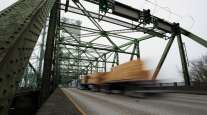Senior Reporter
House Transportation Chairman Peter DeFazio Again Touts Infrastructure Resiliency

[Stay on top of transportation news: Get TTNews in your inbox.]
Policy pertaining to severe weather-resilient infrastructure continues to be a priority for a top transportation lawmaker as he crafts comprehensive highway legislation in the U.S. House of Representatives.
Federal investments in resilient projects around the country would help communities withstand the impact of severe weather events, which in recent years have disabled freight and commuter corridors, Oregon Rep. Peter DeFazio (D-Ore.) said at the start of a hearing Nov. 19.
“We need to better prepare our communities to understand the risks associated with extreme weather events,” said DeFazio, chairman of the Transportation and Infrastructure Committee. “It is imperative that we support initiatives that work toward reducing carbon emissions, combating rising sea levels, investing in renewable energy and building resilient infrastructure.”
DeFazio added, “I am considering ways to do this across all areas of our jurisdiction. Whether it’s reducing carbon emissions across all modes of transportation or reducing greenhouse gas emissions from pipelines and wastewater systems, we must do more.”
Recent hurricanes in Texas, Florida, Puerto Rico and the U.S. Virgin Islands, as well as record flooding along the lower Mississippi River have helped drive national discussions about infrastructure needs, the chairman further explained.
DeFazio, who is leading the drafting of a multiyear surface transportation measure meant to update a 2015 highway law that expires next year, is among several members of the Democratic caucus advocating for policies meant to respond to climate change. Doing so, lawmakers explain, could help avoid interrupting the flow of goods and services.

Napolitano
Water Resources and Environment Subcommittee Chairwoman Grace Napolitano also raised the point alongside DeFazio on Nov. 19. As she put it, “I am already having this discussion of aging infrastructure, changing hydrologic conditions, and how we can better respond to these changes in my district in Southern California. … I recognize that what resiliency means for California will be different than what it means for the Midwest, or the Eastern Seaboard.”
On the Senate side, transportation leaders this summer advanced the America’s Transportation Infrastructure Act, which proposed investing $5.5 billion in a program dedicated to enhancing resiliency.

Barrasso
“A large part of improving road safety is making sure America has durable highways and bridges that last. From rock slides in Wyoming to hurricanes and Nor’easters on the Delaware coast, we need roads that can withstand natural disasters and the worsening impacts of our changing climate,” the bill’s sponsors, Sens. John Barrasso (R-Wyo.) and Tom Carper (D-Del.), said in a joint column Nov. 20. Together, they lead the Environment and Public Works Committee.

Carper
“Our bill includes the first climate change title of its kind, providing flexible resources to help states reduce emissions. States could receive these funds to help mitigate traffic congestion in urban areas or to develop plans to reduce transportation-related emissions,” the senators added. “Our highways and transportation infrastructure are critical to our country’s success. They are vital arteries of commerce, connecting rural areas to major cities. It’s time to make a significant investment in them.”
Republican managers in the Senate have not announced a road map for the measure to reach the chamber’s floor.
Several infrastructure stakeholders, meanwhile, express support for resilient policy. Last month, Jeremy Gregory, executive director of the MIT Concrete Sustainability Hub, and Michael Ireland, CEO of the Portland Cement Association, co-wrote a column urging action in Congress.
“Now is the time to act because more potential challenges and disastrous weather events are around the corner,” they wrote Oct. 31. “We need every policy we can develop that strengthens and protects our infrastructure for the long haul. We need to focus more of our attention on a very worthy, and sorely needed, ounce of prevention.”
Want more news? Listen to today's daily briefing:




